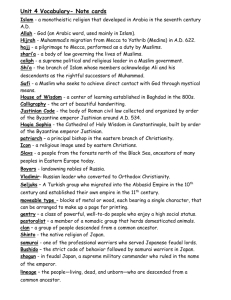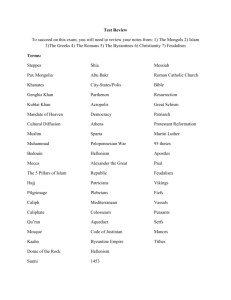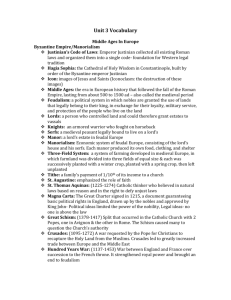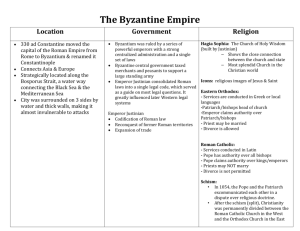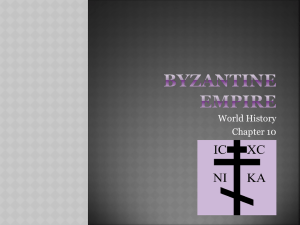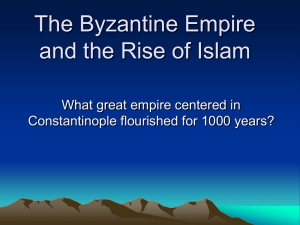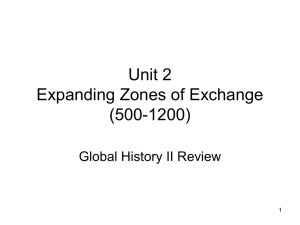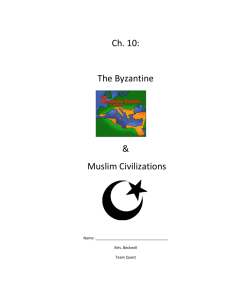unit 3 vocab wh
advertisement
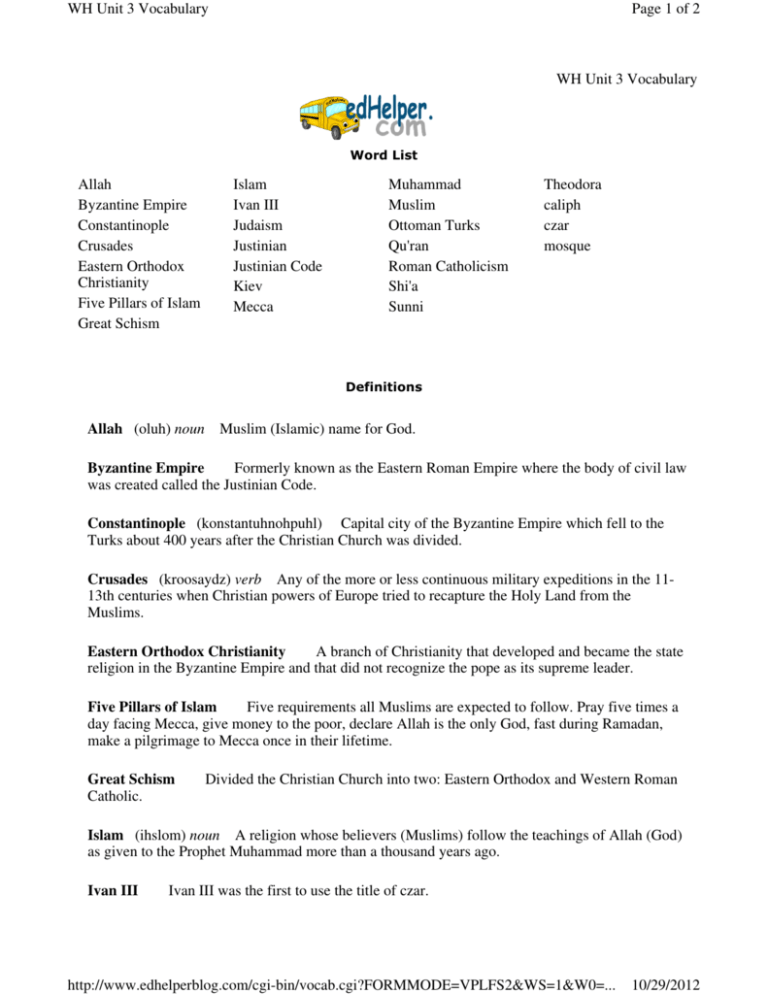
WH Unit 3 Vocabulary Page 1 of 2 WH Unit 3 Vocabulary Word List Allah Byzantine Empire Constantinople Crusades Eastern Orthodox Christianity Five Pillars of Islam Great Schism Islam Ivan III Judaism Justinian Justinian Code Kiev Mecca Muhammad Muslim Ottoman Turks Qu'ran Roman Catholicism Shi'a Sunni Theodora caliph czar mosque Definitions Allah (oluh) noun Muslim (Islamic) name for God. Byzantine Empire Formerly known as the Eastern Roman Empire where the body of civil law was created called the Justinian Code. Constantinople (konstantuhnohpuhl) Capital city of the Byzantine Empire which fell to the Turks about 400 years after the Christian Church was divided. Crusades (kroosaydz) verb Any of the more or less continuous military expeditions in the 1113th centuries when Christian powers of Europe tried to recapture the Holy Land from the Muslims. Eastern Orthodox Christianity A branch of Christianity that developed and became the state religion in the Byzantine Empire and that did not recognize the pope as its supreme leader. Five Pillars of Islam Five requirements all Muslims are expected to follow. Pray five times a day facing Mecca, give money to the poor, declare Allah is the only God, fast during Ramadan, make a pilgrimage to Mecca once in their lifetime. Great Schism Catholic. Divided the Christian Church into two: Eastern Orthodox and Western Roman Islam (ihslom) noun A religion whose believers (Muslims) follow the teachings of Allah (God) as given to the Prophet Muhammad more than a thousand years ago. Ivan III Ivan III was the first to use the title of czar. http://www.edhelperblog.com/cgi-bin/vocab.cgi?FORMMODE=VPLFS2&WS=1&W0=... 10/29/2012 WH Unit 3 Vocabulary Page 2 of 2 Judaism (joodayihzuhm) The monotheistic religion of the Jews; based on the Old Testament and the Talmud. Called their god Yahweh. Justinian In 527, he became the emperor of the Eastern Roman Empire and set out to reconquer areas of the Western Empire which had Great Byzantine emperor who made many changes in the laws that are still in effect. He built great churches, and was married to Theodora who helped him rule. Justinian Code The body of Roman civil law collected and organized by order of the Byzantine emperor Justinian around A.D. 534. Kiev (keeEHv) A powerful city in Russia under Yaroslav the Wise. Mecca (mEHkuh) noun The Muslim holy land. Mohammed fought to retake this land. Muslims must take a pilgrimage to this city to which all Muslims pray. Muhammad (muhomuhd) noun Prophet and founder of Islam who proclaimed the message of God; considered by Muslims to be the last and greatest of the prophets. Muslim (muhzluhm) noun,adjective Ottoman Turks in 1453. Qu'ran A believer or follower of Islam. The non-Christian enemies of the Byzantine Empire; captured the Byzantines The holy book of Islam. Roman Catholicism A Latin-based branch of Christianity that developed in the western Roman empire and that recognized the Pope as its supreme head. Shi'a The branch of Islam whose members acknowledge Ali and his descendants as the rightful successors of Muhammad. Sunni (soonee) Mohammed. The branch of Islam that accepts the first four caliphs as rightful successors to Theodora (theeuhdawruh) Wife to Justinian who held a strong influence over her husband and helped convince him to stay and put down a rebellion. She established more rights for women and was the most influential woman of the empire. caliph (kaluhf) The civil and religious leader of a Muslim state; a successor of Muhammad. czar (zor) noun A Russian emperor (from the Roman title Caesar). mosque (mosk) noun A Muslim place of worship. http://www.edhelperblog.com/cgi-bin/vocab.cgi?FORMMODE=VPLFS2&WS=1&W0=... 10/29/2012
